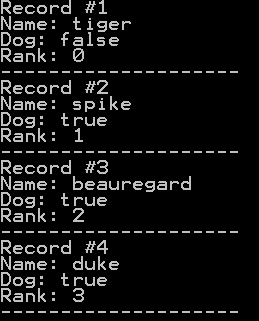Int Sort

/*--------------------------------------------------
* IntSort.java
*
* Sort records that contain multiple Java
* data types. Sort using integer type.
*
* Uses: Streams, Enumeration, RecordComparator
*
* No GUI interface, all output is to the console
* Example from the book: Core J2ME Technology
* Copyright John W. Muchow http://www.CoreJ2ME.com
* You may use/modify for any non-commercial purpose
*-------------------------------------------------*/
import java.io.*;
import javax.microedition.midlet.*;
import javax.microedition.rms.*;
public class IntSort extends MIDlet
{
private RecordStore rs = null; // Record store
static final String REC_STORE = "db_4"; // Name of record store
public IntSort()
{
openRecStore(); // Create the record store
writeTestData(); // Write a series of records
readStream(); // Read back the records
closeRecStore(); // Close record store
deleteRecStore(); // Remove the record store
}
public void destroyApp( boolean unconditional )
{
}
public void startApp()
{
// There is no user interface, go ahead and shutdown
destroyApp(false);
notifyDestroyed();
}
public void pauseApp()
{
}
public void openRecStore()
{
try
{
// The second parameter indicates that the record store
// should be created if it does not exist
rs = RecordStore.openRecordStore(REC_STORE, true );
}
catch (Exception e)
{
// We should pay attention to the actual error thrown
db(e.toString());
}
}
public void closeRecStore()
{
try
{
rs.closeRecordStore();
}
catch (Exception e)
{
db(e.toString());
}
}
public void deleteRecStore()
{
if (RecordStore.listRecordStores() != null)
{
try
{
RecordStore.deleteRecordStore(REC_STORE);
}
catch (Exception e)
{
db(e.toString());
}
}
}
/*--------------------------------------------------
* Create three arrays to write to record store
*-------------------------------------------------*/
public void writeTestData()
{
String[] pets = {"duke", "tiger", "spike", "beauregard"};
boolean[] dog = {true, false, true, true};
int[] rank = {3, 0, 1, 2};
writeStream(pets, dog, rank);
}
/*--------------------------------------------------
* Write to record store using streams.
*-------------------------------------------------*/
public void writeStream(String[] sData, boolean[] bData, int[] iData)
{
try
{
// Write data into an internal byte array
ByteArrayOutputStream strmBytes = new ByteArrayOutputStream();
// Write Java data types into the above byte array
DataOutputStream strmDataType = new DataOutputStream(strmBytes);
byte[] record;
for (int i = 0; i < sData.length; i++)
{
// Write Java data types
strmDataType.writeUTF(sData[i]);
strmDataType.writeBoolean(bData[i]);
strmDataType.writeInt(iData[i]);
// Clear any buffered data
strmDataType.flush();
// Get stream data into byte array and write record
record = strmBytes.toByteArray();
rs.addRecord(record, 0, record.length);
// Toss any data in the internal array so writes
// starts at beginning (of the internal array)
strmBytes.reset();
}
strmBytes.close();
strmDataType.close();
}
catch (Exception e)
{
db(e.toString());
}
}
/*--------------------------------------------------
* Read from the record store using streams
*-------------------------------------------------*/
public void readStream()
{
try
{
// Careful: Make sure this is big enough!
// Better yet, test and reallocate if necessary
byte[] recData = new byte[50];
// Read from the specified byte array
ByteArrayInputStream strmBytes = new ByteArrayInputStream(recData);
// Read Java data types from the above byte array
DataInputStream strmDataType = new DataInputStream(strmBytes);
if (rs.getNumRecords() > 0)
{
ComparatorInt comp = new ComparatorInt();
int i = 1;
RecordEnumeration re = rs.enumerateRecords(null, comp, false);
while (re.hasNextElement())
{
// Get data into the byte array
rs.getRecord(re.nextRecordId(), recData, 0);
// Read back the data types
System.out.println("Record #" + i++);
System.out.println("Name: " + strmDataType.readUTF());
System.out.println("Dog: " + strmDataType.readBoolean());
System.out.println("Rank: " + strmDataType.readInt());
System.out.println("--------------------");
// Reset so read starts at beginning of array
strmBytes.reset();
}
comp.compareIntClose();
// Free enumerator
re.destroy();
}
strmBytes.close();
strmDataType.close();
}
catch (Exception e)
{
db(e.toString());
}
}
/*--------------------------------------------------
* Simple message to console for debug/errors
* When used with Exceptions we should handle the
* error in a more appropriate manner.
*-------------------------------------------------*/
private void db(String str)
{
System.err.println("Msg: " + str);
}
}
/*--------------------------------------------------
* Compares two integers to determine sort order
* Each record passed in contains multiple Java data
* types - use only the integer data for sorting
*-------------------------------------------------*/
class ComparatorInt implements RecordComparator
{
private byte[] recData = new byte[10];
// Read from a specified byte array
private ByteArrayInputStream strmBytes = null;
// Read Java data types from the above byte array
private DataInputStream strmDataType = null;
public void compareIntClose()
{
try
{
if (strmBytes != null)
strmBytes.close();
if (strmDataType != null)
strmDataType.close();
}
catch (Exception e)
{}
}
public int compare(byte[] rec1, byte[] rec2)
{
int x1, x2;
try
{
// If either record is larger than our buffer, reallocate
int maxsize = Math.max(rec1.length, rec2.length);
if (maxsize > recData.length)
recData = new byte[maxsize];
// Read record #1
// We want the integer from the record, which is
// the last "field" thus we must read the String
// and boolean to get to the integer
strmBytes = new ByteArrayInputStream(rec1);
strmDataType = new DataInputStream(strmBytes);
strmDataType.readUTF();
strmDataType.readBoolean();
x1 = strmDataType.readInt(); // Here's our data
// Read record #2
strmBytes = new ByteArrayInputStream(rec2);
strmDataType = new DataInputStream(strmBytes);
strmDataType.readUTF();
strmDataType.readBoolean();
x2 = strmDataType.readInt(); // Here's our data
// Compare record #1 and #2
if (x1 == x2)
return RecordComparator.EQUIVALENT;
else if (x1 < x2)
return RecordComparator.PRECEDES;
else
return RecordComparator.FOLLOWS;
}
catch (Exception e)
{
return RecordComparator.EQUIVALENT;
}
}
}
Related examples in the same category